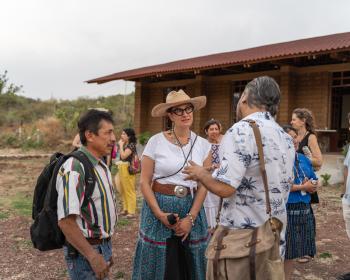
By Erika Mayer
On May 26, 2015, the Passamaquoddy and Penobscot Tribal delegates—Matthew Dana II and Wayne Mitchell, respectively—withdrew from the Maine legislature. Their reasons for doing so were a long list of grievances against the state of Maine involving fishing rights and, by extension, rights to Tribal sovereignty. These violations of Penobscot and Passamaquoddy rights undermined what should have been an equal, not subordinate, relationship with the state.
The Passamaquoddy, Penobscot, and Houlton Band of Maliseet Indians are allocated one seat each in the Maine House of Representatives. They may present bills and participate in committees, although they cannot not vote. For the Passamaquoddy Tribe and the Penobscot Nation, relations with the state have been deteriorating for years due to violations of the Tribes’ fishing rights. These fishing rights are protected under the 1980 Maine Indian Claims Settlement Act, a historic piece of legislation that returned land to the Penobscot and Passamaquoddy and gave the Tribes rights regarding the use of those lands. Understanding the history of this act is key to understanding the situation of the Tribes in the present day.
In the late 18th Century, both the Penobscot Nation and the Passamaquoddy Tribe ceded land to the Commonwealth of Massachusetts through treaties. These treaties, however, ignored an important law, the recently passed 1790 Intercourse Act, which stipulated that land cessions from Native Americans had to be ratified by the U.S. Congress. Because the land was transferred without Congressional approval, the transactions were illegal.
Illegal though they may have been, the land cessions were considered valid for well over a century. In 1972, that finally began to change when the Justice Department filed a lawsuit against the state of Maine that addressed the illegal transfers of Passamaquoddy and Penobscot land. President Carter himself took an interest in the case in 1977, forming a task force to negotiate with the Penobscot and the Passamaquoddy. After a complex legal and political struggle lasting several years, the Settlement Act was at last presented to and approved by the House and Senate in 1980. The act granted federal recognition to the Penobscot, the Passamaquoddy, and the Houlton Band of Maliseet Indians. The Penobscot and the Passamaquoddy received $26.8 million each to purchase land and an additional $12.5 million each in the form of a trust fund. In turn, the Penobscot and the Passamaquoddy gave up all other land claims. The money they received was ultimately used to purchase 300,000 acres of land.
Crucially, the 1980 Maine Indian Claims Settlement Act also guarantees that the Passamaquoddy Tribe and Penobscot Nation have the right to hunt and fish on their reservations. It is this right that has been called into question in recent years by the state of Maine, which has attempted to limit, control, and, in the case of the Penobscot River, even prohibit fishing from waters that have traditionally belonged to the Tribes.
This failing relationship between the state and the Tribes has been exacerbated by a recent executive order from Maine Governor Paul LePage. The situation was very different in 2011, when Governor LePage appeared eager to cooperate with the Tribes. On August 26 of that year, LePage issued an executive order titled “An Order Recognizing the Special Relationship Between the State of Maine and the Sovereign Native American Tribes Located Within the State of Maine.” The order stated that “the Passamaquoddy Tribe, the Penobscot Nation, the Aroostook Band of Micmacs, and the Houlton Band of Maliseets are sovereign nations in their own right” and described the relationship between Maine and the Tribes as “a relationship between equals.” The order went on to promote more effective communication for sharing information and ensuring Tribal governments’ involvement in decisions and policies.
Yet in the years following 2011, the relationship between the state and the Tribes began to deteriorate over fishing rights. As conflict over Tribal rights mounted, Governor LePage issued a second executive order on April 16 of this year. This second order rescinded the 2011 executive order that had promoted better communication. Although it initially reaffirmed the sovereignty of the Tribes, it stated that “all Tribe members, Indian nations, and Tribes and bands of Indians in the State and any lands or other natural resources owned by them or held in trust for them are subject to the laws of the State and to the civil and criminal jurisdiction of the courts of the State to the same extent as any other person or lands or other natural resources therein.” It also specified that the reason for rescinding the 2011 executive order was that “previous efforts by the Governor on behalf of the State of Maine to promote collaboration and communication with the Tribes have proved to be unproductive because the State of Maine’s interests have not been respected in the ongoing relationship between sovereigns.” By stating that all Tribe members and their natural resources are subject to state laws, the order undermined Tribal sovereignty. And by rescinding the previous order promoting communication, Governor LePage’s new order dealt a blow to the possibility of respect and cooperation between the Tribes and the state and deepened existing tensions.
In addition to this shared history, the Penobscot Nation and the Passamaquoddy Tribe have their own unique struggles. The Penobscot have sent representatives to the Maine Legislature since as early as 1823. Their recent struggle against the state involves fishing rights on the Penobscot River—the very river that bears the name of their Nation. Although the 1980 Maine Indian Claims Settlement Act made it legal for Penobscot to fish and hunt along a section of the river for subsistence, even without a license, in 2012 this right was challenged by Maine Attorney General William Schneider. Schneider claimed that despite the river’s location on the Penobscot Reservation and its very name, the Penobscot did not have the right to sustenance fishing on the river.
The Penobscot have not been quiet about this violation of their rights. In 2012, the Penobscot Nation filed a lawsuit against the state, a lawsuit that is ongoing today and that has garnered support from the federal government. Mark Chavaree, a member of and staff attorney for the Penobscot Nation, commented: “This case addresses our right to fish within our Reservation for our sustenance and to regulate the taking of wildlife within the Reservation, both of which are fundamental rights of the Penobscot Nation recognized by the Maine Indian Claims Settlement Act of 1980.”
Water quality is another pressing issue. Towns along the Penobscot River use it for wastewater and industrial runoff, causing elevated mercury levels and raising questions about whether sustenance fishing from the river water is truly safe. The Penobscot Nation has made efforts to increase water quality, efforts that benefit both the environment itself and the people who depend on the river for clean, healthy food. Once again, the Nation has the support of the federal government: on February 2, 2015, the Environmental Protection Agency stated that Maine must take action to protect the water quality of the river and, by doing so, protect the Penobscot Nation’s sustenance fishing.
The Passamaquoddy have sent representatives to the Maine legislature since as early as 1842. One of their main struggles involves the right to fish for elvers, or juvenile eels, which can sell for as much as $2000 per pound. In 2012, the Passamaquoddy Tribe issued 236 elver fishing licenses; the year before, in 2011, they had issued only two. The sharp increase raised concerns, particularly since the Atlantic States Marine Fisheries Commission limits elver licenses in Maine to 744. The next year, Governor LePage signed a law that prohibited the Passamaquoddy Tribe from issuing more than 200 elver licenses for the year; the Tribe then issued 575 licenses. In 2014, the state made all Tribal licenses that had not been individually approved by the state illegal. The Passamaquoddy Tribe has insisted on exercising their right to issue their own Tribal licenses despite the laws that restrict their sovereignty—a decision that led to a confrontation with the Maine Marine Patrol in 2013.
Although attempts to limit elver licenses were ostensibly made with the intent to protect the eels, whose population could be adversely affected by the additional fishing, the Passamaquoddy Tribe does have measures in place to ensure that their fishing is sustainable. The state of Maine may issue a limited number of licenses, but each person with a license is permitted to catch as many elvers as they can. The Passamaquoddy Tribe, however, limits the Tribe’s total catch to 3,600 pounds, no matter how many licenses have been issued. The Tribe and state have also disagreed over the number of Tribe members who should be allowed to use fyke nets, a type of net that is more effective at catching elvers and that could therefore be detrimental to their population numbers. Yet the Passamaquoddy Tribe has its own rules about how these nets are spaced to ensure the safety of the eel population.
This past May, all of these grievances became too much for the Passamaquoddy and Penobscot representatives. Mark Chavaree commented that, because the state of Maine has not recognized the Penobscot as equals or respected their rights, the effect of the withdrawal will likely be minimal:
“From the Tribes' perspective, we do not believe the withdrawal of the Penobscot and Passamaquoddy representatives from the Maine State legislature will have a significant impact. The Tribes determined that we could no longer participate in a system that does not recognize us as sovereign Tribal governments, that does not reflect a government to government relationship and which has marginalized the Tribes by treating us as subdivisions of the State. The State's legislative system is theirs and is based upon their values. The Tribes do not benefit by participating in a system that does not respects us, fails to recognize us as equals and perpetuates a relationship of ward to guardian. We understood the Settlement Act to recognize our inherent sovereignty as Indian Tribes and to end 160 years of this paternalistic attitude from the State. We will continue to strive to live in a way consistent with our culture and worldview. How the State perceives this withdrawal and what actions they may take in response is unknown at this point.”
The withdrawal of the delegates is about fishing, certainly, but it is also about sustenance and sovereignty. Tribes in Maine have been suffering economically, and protecting their rights to the waters they have lived with for centuries is vital to their economies, their cultures, and their independence. Sovereignty, and its true meaning, is critical to the discussion. On the concept of sovereignty, Mark Chavaree writes:
“Sovereignty is not a Native concept but in order to survive, we must adapt. Recognition of Tribal sovereignty is necessary for us to exist as an independent group with a unique contribution to the larger society. Too often sovereignty is perceived in terms of authority over others, the State continues to perpetuate that view in the way it exercises its sovereignty. In my view true Penobscot sovereignty is expressed in terms of freedom, self-determination and autonomy - the freedom to practice our culture, the self-determination to live our lives consistent with our worldview and the autonomy to be ourselves, as we have for thousands of years. There are efforts beginning within our Native communities to revive our languages, reclaim our birth, coming of age and death rituals and teach our children the ways of our ancestors. We have established structures to provide for business development and home purchases within our communities, we are moving toward food security and are taking care of ourselves in a way that works for us. Having the freedom to pursue economic ventures consistent with our cultural values will elevate the health and well-being of our members and our communities. These are all expressions of sovereignty.”
How could the state repair the broken relationship with the Tribes? Mark Chavaree writes that, for the Penobscot Nation, recognizing the fact that the Penobscot Reservation includes the River is “a necessary first step.” To do otherwise, he writes, is “disgraceful”; the Penobscot are a riverine people, and the Penobscot River has been important to them for thousands of years. In addition to giving the Penobscot Nation their right to the Penobscot River, Mark Chavaree notes, “State leaders need to change their attitude and behavior toward the Maine Tribes. They must respect and recognize Tribal self-governance, treat Tribal leaders as equals and value the well-being of Tribal people. It is my hope that the State will someday recognize the importance of a mutually respectful relationship with the Tribes so that together we can create a better future for Maine.”
Photo courtesy of



